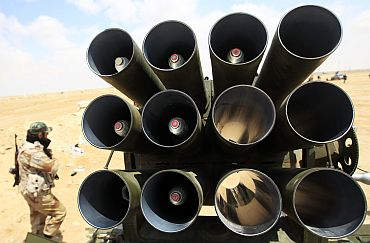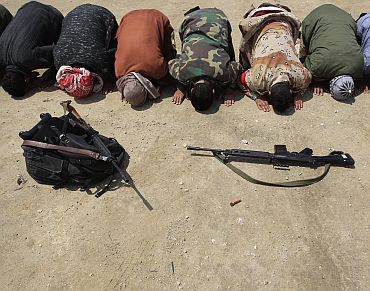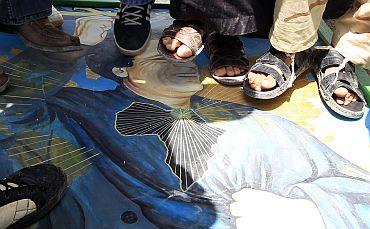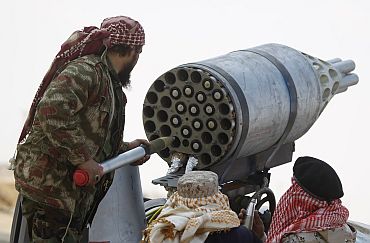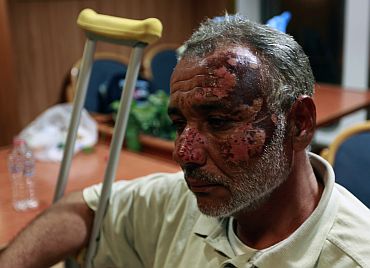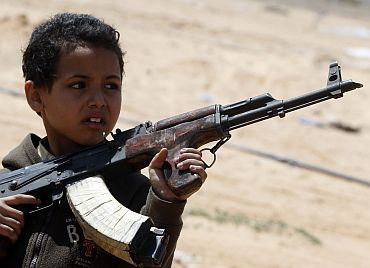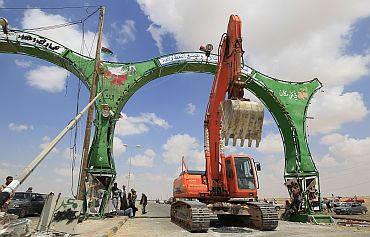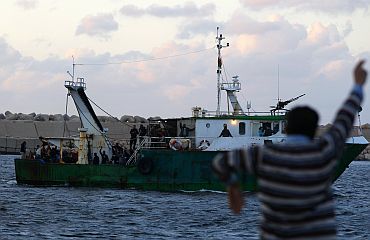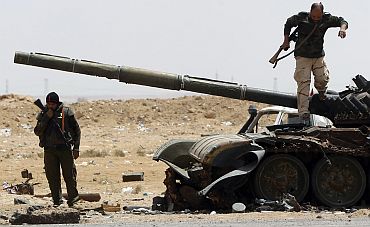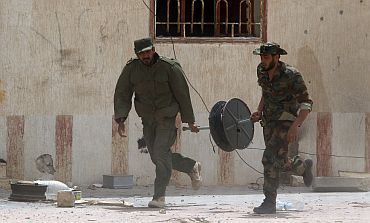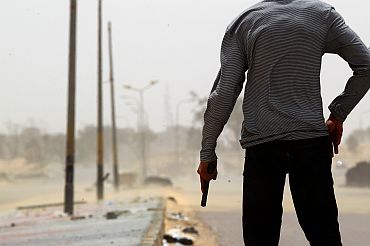 | « Back to article | Print this article |
Pitched battle in Libya 'kills 10,000'
The Libyan government has agreed to facilitate 'safe passage' to United Nations aid workers into Misurata, the western besieged town amid a severe humanitarian crisis as opposition leaders claimed that at least 10,000 people have been killed in the conflict since February.
The UN said they have been promised "safe passage" for UN aid workers into Misurata amid severe shortages of food, power, water and medicine in the face of intense shelling by forces loyal to Gaddafi.
Please click NEXT to see more pictures...
Pitched battle in Libya 'kills 10,000'
Valerie Amos, the UN humanitarian chief, secured the deal through talks in Tripoli.
The top UN official was told by Libyan authorities that the government was willing to set up "safe passage" out of the city, which remains partially under the control of the rebels after weeks of attacks by the army.
The government has promised UN aid workers and their equipment access to all areas under their control, BBC said.
Pitched battle in Libya 'kills 10,000'
Amid efforts to get humanitarian access to Misurata and efforts to evacuate those stranded, Al Jazeera quoted witnesses as saying that the pro-Gaddafi forces on Tuesday pounded the port city with rockets and artillery.
The city, which was living under the threat of bombardment, was facing severe shortages of food, water, fuel and electricity.
At least 20 people died while queuing for bread when Grad rockets rained down on them, it said.
"There is no safe place left here," a Sudannese woman was quoted as saying.
Pitched battle in Libya 'kills 10,000'
Rebel leaders claimed that at least 10,000 people have died since the start of the conflict in February, Al Jazeera said.
"Given the intensity of the conflict, it doesn't come as a surprise," it said.
"We have focused on areas like Misurata, where the humanitarian crisis is well documented, however it is happening throughout Libya, the full extent of the crisis is not known and there is no real idea of (casualty) figures," the channel said in a report.
Pitched battle in Libya 'kills 10,000'
Britain's Department for International Development said approximately 300 civilians had been killed and a further 1,000 injured since late February in Misurata.
However, media reports said 1,000 people are estimated to have been died in the fighting in Misurata and "80 per cent of the deaths are civilians".
In the eastern battlefront, the opposition and the government forces were involved in a seesaw battle for the control of the strategic city of Ajdabiya, which is being used by the anti-Gaddafi forces as a staging post to regain the strategic oil port of Brega, 80-km west of Ajdabiya.
Amid fears of a stalemate in the conflict, Britain on Tuesday decided to send military officers to Libya to advise rebels.
UK Foreign Secretary William Hague said the group would be deployed in Benghazi, stronghold of the opposition's Transitional National Council.
Ten British officers will provide logistics and intelligence training, part of a joint British and French operation, BBC said.
ven as Hague underlined that the officers would not be involved in any fighting, the decision comes amid growing complaints by Libyan rebels that the western alliance has not provided enough support to the anti-Gaddafi forces in the conflict.
"The (UK) National Security Council has decided that we will now move quickly to expand the team already in Benghazi to include an additional military liaison advisory team," Hague was quoted as saying by BBC.
"This contingent will be drawn from experienced British military officers," he said.
Pitched battle in Libya 'kills 10,000'
The deal between the Libyan government and the UN for humanitarian access to Misurata was finalised after Amos apparently pledged to increase the world body's presence in the capital.
The UN humanitarian chief, however, said she received "no guarantees" of a cessation of hostilities "to enable people to move" or for supplies to be delivered, Al Jazeera reported.
Amid the fierce battle between Gaddafi's troops and rebels, nearly 1,000 foreign workers and wounded Libyans were evacuated from Misurata, the lone rebel bastion 214 kilometres east of the capital Tripoli that been under siege for over seven weeks.
"The ship docked in Benghazi straight from Misurata carrying 970 passengers on board," Al Jazeera said.
The International Organisation for Migration said at least 4,000 more are awaiting rescue and that the situation on the ground is getting increasingly difficult for further evacuation missions.
Pitched battle in Libya 'kills 10,000'
The Special Envoy of UN Secretary-General Ban Ki-moon to Libya, Abdul Ilah Al-Khatib, and Amos visited Tripoli on Sunday.
"I am encouraged to report that, as a result, the UN reached an agreement on a humanitarian presence in Tripoli," Ban told reporters on Monday in Budapest.
Ban said that the UN had already established a humanitarian presence in Benghazi and now the Libyan authorities have agreed to establish a humanitarian presence in Tripoli.
"We will try to expand our humanitarian activities together with other international NGOs and humanitarian workers like the Red Cross and Red Crescent," he said.
An International Committee of the Red Cross team, led by Jean-Michel Monod who has headed the ICRC delegation in Tripoli for the last few weeks, reached Misurata to assess the deepening humanitarian crisis.
A month after the UN Security Council passed resolution 1973 authorizing use of force in Libya, top leaders of US, UK and France have vowed to intensify its air strikes to force Gaddafi to quit amid growing international division over the military campaign in the north African country.
Pitched battle in Libya 'kills 10,000'
A key meeting of NATO foreign ministers in Berlin last week saw several members rebuffing calls from France and Britain for additional combat aircraft for air strikes.
NATO, which has deployed nearly 200 aircraft for the military campaign, said it needed nine more attack jets to launch raids in Libya.
Only few of NATO's 28 members are taking part in the air strikes, with key nations such as Spain and Italy reluctant to be involved in the bombings on Gaddafi's forces.
Russia' on Tuesday charged that the UN mandate for intervention in Libya was being blatantly violated by those who want regime change and pleaded for an urgent ceasefire.
"Those who use the UN security council resolution for that goal (regime change) are openly violating the mandate they were given by the United Nations," Russian foreign minister Sergei Lavrov said after talks with Serbian counterpart Vuk Jeremic.
Pitched battle in Libya 'kills 10,000'
Last week in the Chinese city of Sanya, India and four other emerging nations forming the BRICS grouping collectively voiced their opposition to the use of force in Libya.
Mustafa Abdel Jalil, the head of the opposition Transitional National Council, was in Rome to meet Italian Prime Minister Silvio Berlusconi on Tuesday to urge him to convince NATO powers to step up its air strikes on the Libyan troops.
"Gaddafi will never give up power except by force," Jalil said soon after meeting Italian Foreign Minister Franco Frattini.
Amid the intense conflict, the Human Rights Watch
has accused Gaddafi's forces of targeting civilians by firing cluster bombs into residential areas. However, the government has denied the allegations.
Pitched battle in Libya 'kills 10,000'
Lt Gen Charles Bouchard, NATO's top commander leading the military operations in Libya, accused Gaddafi's forces of employing "underhand and immoral" tactics.
"Gaddafi forces have taken their uniforms off, they're hiding on rooftops of mosques, hospitals, schools, that's where their heavy equipment is positioned, near mosques, near schools, and they're shielding themselves with women and children," he was quoted as saying by BBC.
"So when people ask me why aren't you doing something, well I'm not going to lower to his level. I'm not going to do the kind of warfare that he's doing. My job's to help the population," he underlined.
The US, which was spearheading the air campaign in Libya till March 31, has taken a back seat and has allowed British and French warplanes to take the lead.
The US has expressed its full confidence NATO and its European allies achieving its objectives in Libya.
"We believe that NATO has the capability and the capacity to fulfill the mission it has taken to lead, command and control in enforcing UN Security Council Resolution 1973," the White House Press Secretary Jay Carney told reporters at his news conference on Monday.
He said that the Obama administration has no plans to change supportive role in Libya right now.
"Our role is as the (US) President promised it would be, which is to support and assist, and it remains an important role but not a lead role.
Pitched battle in Libya 'kills 10,000'
"We provide capacities for jamming, for tanker refuelling, for intelligence gathering and the like, and we continue to work with our NATO partners to find if there are other ways that we can assist," he said.
The Pentagon on Monday said US continues to fly approximately seven to nine sorties per day. Over the weekend, there were three strikes by F-16CJs in support of this mission.
Gaddafi's son Saif has hit out at western nations for the massive air strikes carried out in Libya.
Blaming the rebellion against his father's regime on Al Qaeda, Saif said the Americans, should have rather helped Libya root out the "terrorists".
